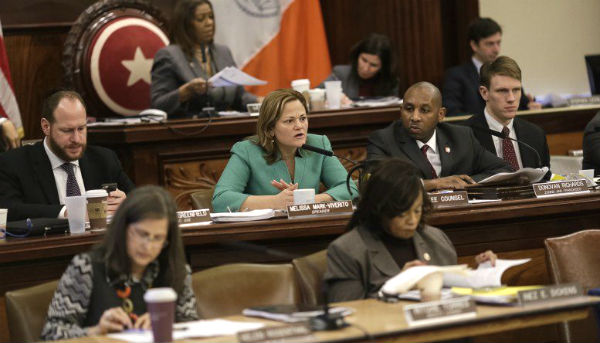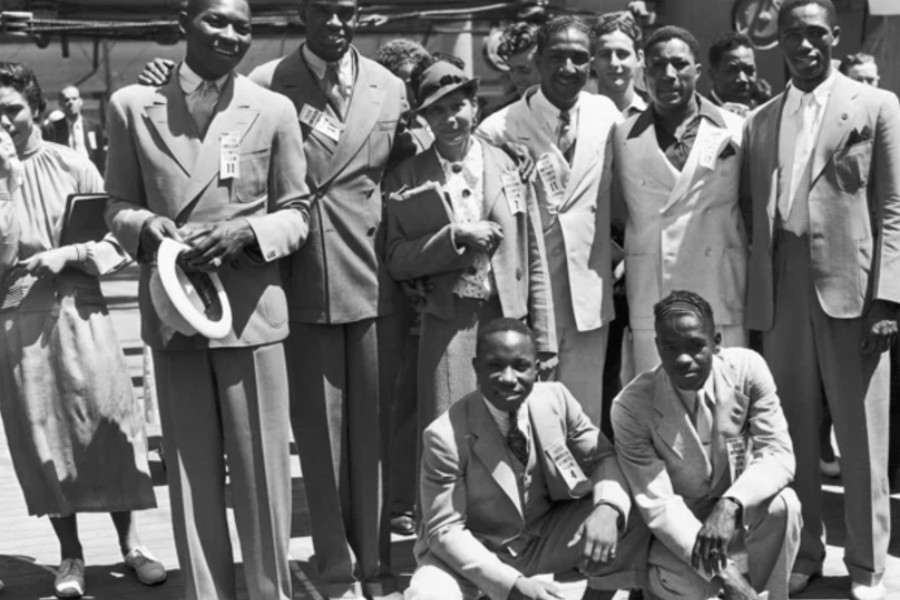 Yesterday, the City Council’s Land Use Committee voted through a contentious bill that would impose deadlines on the Landmarks Preservation Commission and its process of designating historic properties. Preservationists and their allies on the City Council overwhelmingly oppose the bill, Intro 775-A, because it would force the LPC to consider buildings and historic districts within two years of being calendared.
Yesterday, the City Council’s Land Use Committee voted through a contentious bill that would impose deadlines on the Landmarks Preservation Commission and its process of designating historic properties. Preservationists and their allies on the City Council overwhelmingly oppose the bill, Intro 775-A, because it would force the LPC to consider buildings and historic districts within two years of being calendared.
“What I would like to ask, is that we move forward trying to get things on the calendar more often in neighborhoods of color, because that is absolutely not happening in LPC,” he said, echoing opinions from other members who rep largely Latino and black neighborhoods. He added that owners deciding on extensions for landmarking “is a huge concern… especially [when landlords want to develop] in neighborhoods like Williamsburg and Bushwick.”
Despite some vocal objections, the committee approved the bill 12 to 4, with one abstention. The majority of the Land Use Committee supported it, but even some members who okayed the bill said the deadlines – and the landmarking process in general – had shortcomings.
The proposal would create a clock that starts when the commission votes to put a property on its calendar, which is the first step on the road to landmark designation. For individual properties, the commission would have a year to hold a public hearing and vote on whether a building should be landmarked. Individual landmarks could get a one-year extension past the deadline for individual buildings, if the landlord approves it. Owners often see landmarking as another layer of a expensive, bureaucratic process that makes it harder to maintain their properties.
For historic districts, the deadline would be two years from the date they’ve been calendared. The commission would get a year to hold a public hearing and then another year to vote on the district.
Once these deadlines pass, the properties or districts are taken off the commission’s calendar. And the LPC can’t request an extension on designating historic districts, at least under the current version of the bill.
The original version of legislation, Intro 775, was even stricter. It proposed a five-year moratorium on reconsidering items that had passed their deadlines and been dropped from the calendar. In that time, landmarks could be demolished, dramatically altered, or otherwise redeveloped. However, 775-A dropped the moratorium – a move that many council members said they were happy about.
Council Members David Greenfield, Brad Lander, Ritchie Torres, Jumaane Williams, and Mark Treyger enthusiastically voted yes on 775-A. They were joined by Council Members Peter Koo (also the bill’s sponsor), Ydanis Rodriguez, Debi Rose, Donovan Richards, Harlem’s Inez Dickens, Andrew Cohen, and Vincent Gentile.
“Put simply, 775-A is a simple, sensible good government reform,” explained Greenfield. “The bill gives LPC plenty of time to consider a landmark. It simply provides a dose of transparency to the landmarks process.”
Torres called the legislation “a watershed achievement,” and Treyger cracked, “I’m hoping to be alive to see the day that the Coney Island boardwalk gets landmarked,” as he voted yes.
On the other hand, Council Member Ben Kallos objected strongly to the deadlines, particularly for historic districts. “This law offers no opportunity for extensions on historic districts,” he said. “Raise your hands – has anyone ever needed an extension an exam, a paper, your taxes? I think having extensions would be helpful.” He added, “I’m concerned with the number of yes votes who admit that the legislation needs work… I urge folks to reconsider their votes, and we can do a B-version that provides a chance to protect our landmarks.”
He voted against the proposal, along with Council Members Rosie Mendez, Inez Barron, and Dan Garodnick. Mendez felt that the bill simply hadn’t been debated enough and needed more public input, even after the six-hour-long public hearing held to debate the original version of the bill last fall. Garodnick felt that the LPC should be able to secure a one-time extension on an individual landmark without the permission of the property owner.
Council Member Antonio Reynoso was the lone abstention. “What I would like to ask, is that we move forward trying to get things on the calendar more often in neighborhoods of color, because that is absolutely not happening in LPC,” he said, echoing opinions from other members who rep largely Latino and black neighborhoods. He added that owners deciding on extensions for landmarking “is a huge concern… especially [when landlords want to develop] in neighborhoods like Williamsburg and Bushwick.”
Via Source
Become a Harlem Insider!
By submitting this form, you are consenting to receive marketing emails from: . You can revoke your consent to receive emails at any time by using the SafeUnsubscribe® link, found at the bottom of every email. Emails are serviced by Constant Contact








